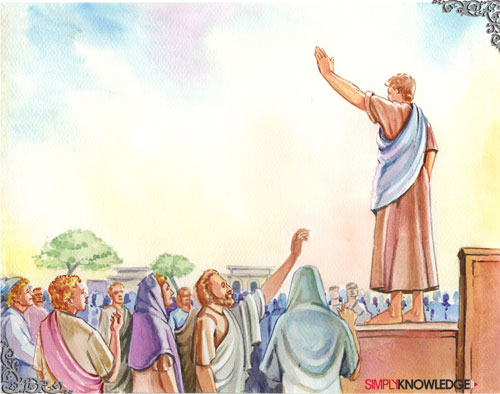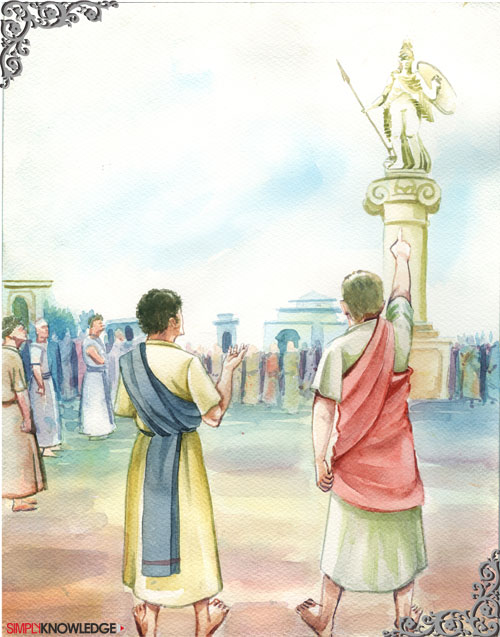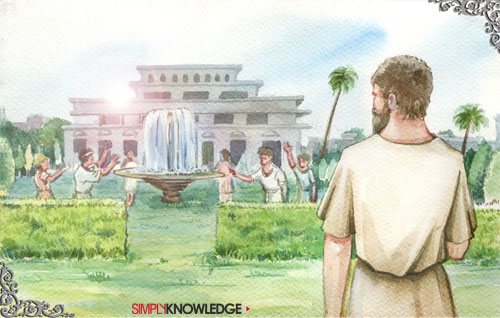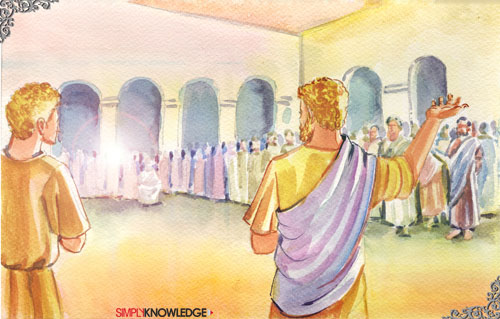


introduction
"She is not more a disgrace to me than I am an honour to her," said Stilpo of Megara when someone complained about the licentious behaviour of his daughter. Perplexed at the response, the complainant fled, believing the great thinker was defending his daughter. Rather, what Stilpo meant was, his daughter’s libertine behaviour indicated she had scant respect for her father. Hence, there was little he could do to check her salacity.
Stilpo preached that the greatest joy emerges from an indomitable mind; especially when individuals are able to control or eliminate their earthly passions. These teachings by Stilpo would indeed have been paradoxical due to his previous lifestyle. But if experience is the greatest teacher, Stilpo definitely learnt from it immensely.

Birth
Stilpo was born in Megara in Attica, Greece in 360BC. Stilpo is also referred to as Stilpon and Stilofon, due to dialectic differences in various parts of ancient Greece.
Details about Stilpo’s parentage are not documented. However, his intelligence and the depth of knowledge about various contemporary subjects indicate he was born in a wealthy aristocratic or trading family which could afford superior quality education, as he grew up.

Life
That Stilpo was born with the proverbial silver spoon is evident from the fact that he was a wastrel from his teens to mid-life. He was excessively fond of expensive liquor, had innumerable ‘heteras’ or mistresses and indulged in expensive luxuries, with scant regard to his family’s reputation. For his ignominious deeds, he was almost banished from Megara.
Stilpo had a long-standing relationship with a ‘hetera’ named Nicarete. He had a daughter, whose name is not documented but it is said, she was married to Stilpo’s friend, a Syracuse citizen called Simias, though none of these accounts are fully credible. It is claimed that the daughter, supposedly an illegitimate progeny, was a nymphomaniac.

Stilpo and the Boy
Legend states that Stilpo, when inebriated, once saw a young boy frolicking merrily in a garden, heedless of the world around. The sheer pleasure reflected by this boy’s demeanour hit Stilpo like a sledgehammer- that true happiness can only be found when the mind is rid of all unnecessary desires and wants. Stilpo flung his cruet, renounced his vices and went in pursuit for true happiness through the various schools of thoughts that flourished during his era.
Numerous but unverifiable accounts claim that Stilpo studied directly under various thinkers including Euclid and Thrasymachus, while other historical evidence indicate he may have studied at schools established by these great Grecian thinkers.
Regardless, Stilpo later lived a sober and chaste life. His past experience with lasciviousness was put to practical use: Stilpo applied moral precepts of the various schools of thoughts about happiness to deal with the intrinsic, avaricious proclivities of individuals. Stilpo believed, the young boy he had seen playing carefree, was a perfect personification about how humans should live their life.
Stilpo preached that humans are the architects of their own sorrows and evils- both, physical and mental because desires can never be fulfilled truly. Each desire, once achieved, creates a bigger one in the human mind till they dominate the human mind and resultant actions. This vicious cycle is ceaseless and deprives humans of all happiness they would otherwise have enjoyed, if they lived a life bereft of unnecessary desires and wants.

Deft politician
Stilpo ardently practiced what he preached. One of his favourite subjects of study was politics and it is believed, he could predict the outcome of any war, depending upon the psychology or morale of the home and enemy troops.
Ptolemy Soter, a general of Alexander the Great was an aficionado of Stiplo’s teachings. Upon conquering Megara from the ruler Antigonus following a war, he offered Stilpo the opportunity to work with him as an advisor in politics and accompany him on the conquest of Egypt. To entice Stilpo, the ruler gifted him a mini fortune.
But Stilpo knew that Ptolemy Soter’s rule would be short lived. He returned most of the treasure, keeping a small portion for himself as a token and sign of appreciation for the ruler’s largesse. He used this money to flee to a safe haven, Aegina, which was a neutral territory.
True to his expectations, Antigonus, regrouped and vanquished Ptolemy Soter within a few months of Stilpo’s self imposed exile. Antigonus, as a reward for his loyalty and patriotism, ordered his troops to leave Stilpo and his home untouched, threatening his soldiers with dire consequences if any harm befell the thinker he revered. However, during the ensuing mayhem, Stilpo had lost everything: his wife, sons and his ancestral home.
Anguished at the atrocities suffered by Stilpo, the ruler Antigonus had the errant soldiers decapitated for disobeying his commands. He summoned Stilpo, apologized and asked him to compile a list of every material possession he had lost during the invasion. To Antigonus’ utter surprise, Stilpo replied: “I have lost nothing. All my possessions are safe,” connoting that despite losing his family and home, he still retained his knowledge- something nobody could rob.
Impressed, Antigonus realized the futility of mental attachment to material pleasures. Although he continued as a ruler for several years, Antigonus often attended Stilpo’s discourses and is said to have often consulted him on various issues related to good governance.
Word about Stilpo’s exceptional behaviour and teachings spread across Greece and soon, he was deluged by people wanting to become his disciples.

Wide following
Such was Stilpo’s demand in ancient Greece that Philippus, a fellow Megarian and renowned historian wrote: “He carried off from Theophrastus, Metrodorus the speculative philosopher, and Timagoras of Gela. From Aristotle the Cyrenaic, he robbed of Clitarchus and Simias while from the dialecticians' school carried away Poeoneius from Aristides. He stole Dippilus of the Bosphorus from Euphantus as also Myrmex of the Venites, who had both come to him to deride him, were overwhelmed by his personality, teachings and demeanour."
Philippus further writes: “Besides, he drew Phrasidemus the Peripatetic, a great natural philosopher and Alcimus the rhetorician, the most eminent orator in all Greece at that time. He impressed Crates the Cynic, and several others, including Zeno of Citium.”
Most students of Stilpo progressed and became renowned in their own right later, having imbibed all the necessary skills and knowledge from their great teacher. Indeed, Zeno of Citium went on to found a new school of thought, Stoicism.
Historians state, Stilpo’s fame was such, whenever he visited Athens or any other major city where great thinkers and their followers flourished, people would leave their work and come out on streets to welcome him. All discourses by Stilpo were well attended by eminent thinkers of the era, especially in Athens- the seat of learning.


God or Goddess ?
During one of these discourses, Stilpo and Theodorus the Atheist locked horns over a rather contentious subject- religion. Stilpo asked Theodorus whether Minerva, the ancient Greek goddess, is the daughter of Jupiter. Theodorus replied in affirmative. He then pointed to a statue of Minerva carved by famous sculptor, Phidias and asked, whether the statue was the daughter of Jupiter or Phidias. Theodorus responded that the statue was indeed the creation of Phidias. “So Minerva is not a God,” asserted Stilpo, implying the statue.
Theodorus, though an atheist, was impudent and vain and charged him with impiety. The case was referred to the Areospagus, the highest Athenian court. Stilpo wittily defended himself saying he had not committed any sacrilege and his statement that Minerva is not a God, was correct.
Wittily, he explained to the judges and jury that the Greek word ‘Theos’ refers to male gods. Minerva is a female and hence, she could not be called ‘God’ or ‘Theos’. Rather, she should be called ‘Thea’ or goddess. The remark was a tacit insult to Theodorus, who was nicknamed ‘Theo’ or God while he preached atheism. Stilpo implied that Theodorus was neither a god nor goddess and hence, a eunuch.
The judges were flummoxed by Stilpo’s argument and sentenced him to leave Athens immediately. But knowing such an order would outrage other thinkers and their followers while fearing that Athens would be discredited for penalizing a man of Stilpo’s stature, the verdict was never implemented.
Theodorus, smarting due to the snub, remarked: “Where did Stilpo learn this knowledge? How does he know whether Minerva is a God or Goddess?”


Stilpo and Crates
Later, Crates of Thebes asked Stilpo whether gods loved people who worshipped them. Stilpo replied: “Be careful Crates, never ask such questions in public. Let us discuss this indoors,” thus wittily implying that religious issues, although fallacious, could be have serious legal consequences upon thinkers.
Once, during a debate, Crates declined to respond to a question but instead, insulted the person. Pained at this behaviour by Crates, also an eminent thinker, he quipped "I had anticipated that he would conceal his own thoughts." Once, Crates, known for his frugal Cynic lifestyle, was suffering in the chill Athenian winter, clad only in a tattered robe and covered by his rucksack. Stilpo mocked him saying: "Crates, you appear to me as though you want a new dress." Crates was abashed at Stilpo’s directness because it implied that the Cynic was suffering needlessly. Nevertheless, he replied Stilpo that students of each school continue to mock one-another but it was unfortunate that a teacher of Stilpo’s repute should choose to jeer another master, especially in the name of virtue.

Death
There are no precise records about Stilpo’s death but it is widely believed he breathed his last in native Megara, where he lived for a better part of his life. He lived a life of a proverbial gentleman and the ubiquitous imp, through his decorous behaviour yet witty banter. He is believed to have died of old age, a content man.
One record, albeit dubious, claims Stilpo, having retired from active teaching, took to heavy drinking once again, which eventually caused his death. There are no records to prove either theory.

Legacy
Stilpo left later day thinkers, including those of the present era, with nine valuable dialogues that offer an insight into his jocosity and thoughts about virtuous life free from mental dominion of desires.
His extant works include: Moschus, Cnistippus, Ptolemy, Choerecrates, Metrocles, Anaximenes and Epigenes. He has also authored a letter to his promiscuous daughter, titled “To my Daughter,” and a compendium on various thoughts by Aristotle.
Most religions of the world accept and try to inculcate Stilpo’s theory that perfect happiness is possible only when the human mind is free from domination of desires. Modern psychologists agree with Stilpo’s teachings, albeit with several variations.
Biography of Stilpo | 0 Comments >>
0 --Comments
Leave Comment.
Your email address will not be published. Required fields are marked.



